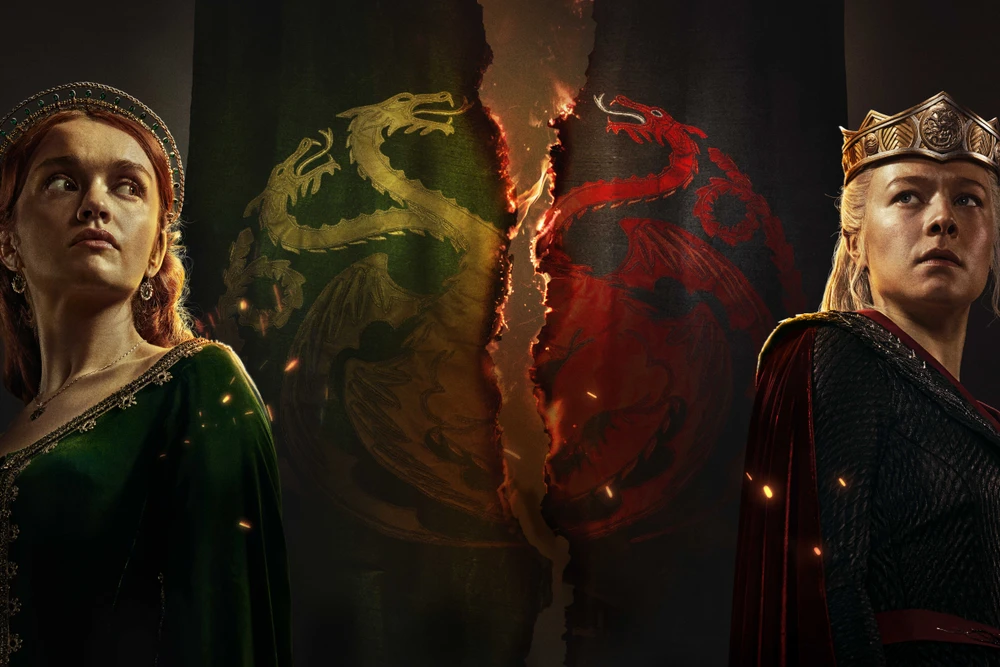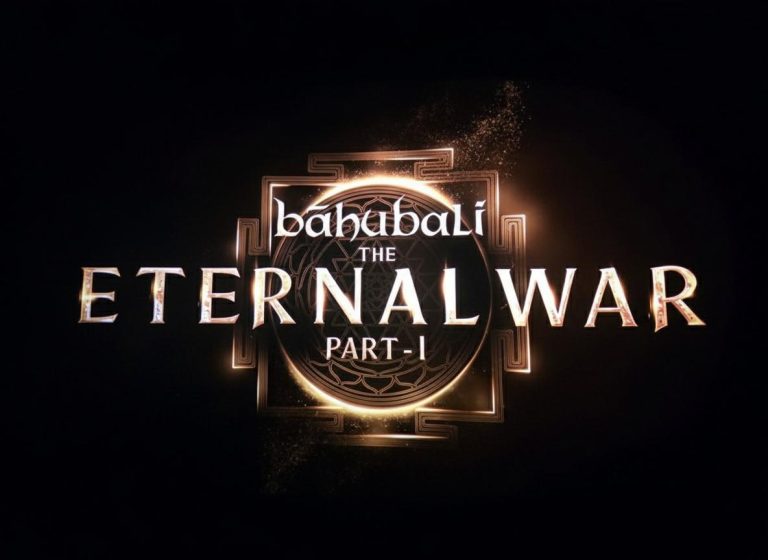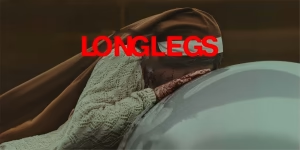The Season 2 finale of “House of the Dragon” delivered epic reunions and important full-circle moments that hark back to “Game of Thrones,” thrilling fans with its intricate plot twists and deep character developments.
As the tension between rival factions reached a boiling point, the episode masterfully set the stage for an even more intense and dramatic Season 3, promising more action, intrigue, and unforgettable battles in the quest for the Iron Throne.
Jason Lannister’s Mission in Essos
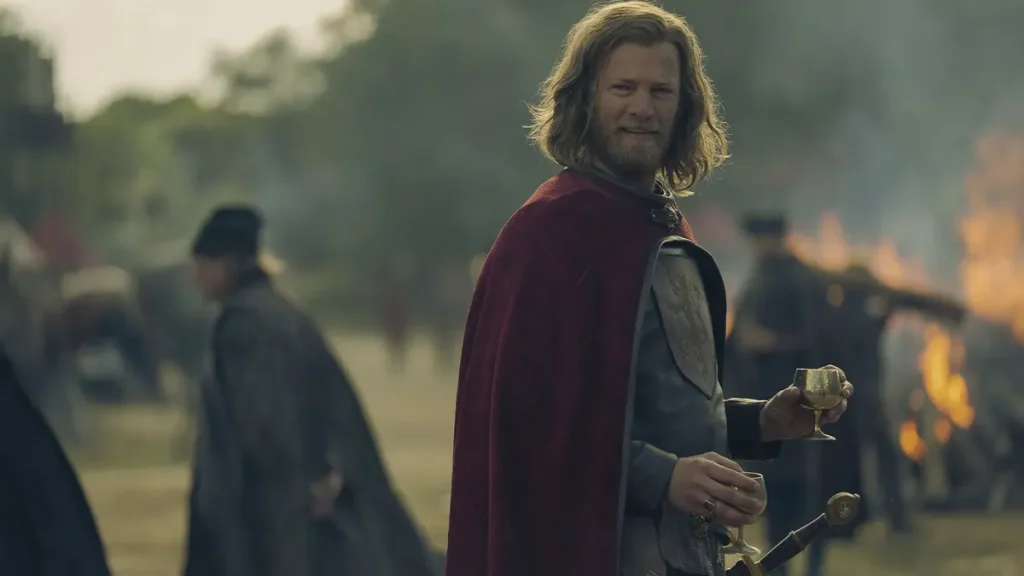
The finale began with Jason Lannister (Jefferson Hall) in Essos, working to acquire a fleet of ships to sail in King Aegon’s name.
Meanwhile, Aemond (Ewan Mitchell) and Vhagar were busy burning the town of Sharp Point to ash in anger after learning that Rhaenyra (Emma D’Arcy) had found three new Dragonriders for the remaining dragons in Dragonstone.
Tensions in King’s Landing
In King’s Landing, Larys (Matthew Needham) told a bedridden Aegon (Tom Glynn-Carney) that his brother was furious over Rhaenyra’s triumph and would soon come for him.
Larys advised that they escape to Braavos and return after Rhaenyra and Aemond had dealt with each other. Aegon then decided he would be known as “Aegon the Realm’s Delight.”
Dragonstone’s New Dragonriders
In Dragonstone, tensions were high. Jacaerys (Harry Collett) was frustrated with the new dragonriders, especially Ulf (Tom Bennett), who was disrespectful despite warnings from Hugh (Keiran Bew).
While Jace put the new dragonriders in their place, Rhaenyra was advised by the Sea Snake (Steve Toussaint) to use her advantage and fly to battle. In a touching moment, he told her he renamed his fleet in his late wife’s honor, calling it “The Queen Who Never Was.”
Daemon’s Moment at Harrenhal
Daemon’s shining moment finally came after weeks at Harrenhal. When Ser Alfred Broome (Jamie Kenna) suggests Daemon use his amassed army for his own gain, Daemon rebuffs him, showing his loyalty to the Queen.
While the Blacks continued building their army, Aemond grew nervous in King’s Landing and tried to force his sister Helaena (Phia Saban) to ride her dragon into battle. Alicent (Olivia Cooke) intervened, accusing Aemond of trying to corrupt Helaena.
Rising Tensions and Daemon’s Vision
Rhaenyra’s patience was tested as Ulf misbehaved again during a tense dinner in Dragonstone. She received word from Ser Simon Strong (Simon Russell Beale) warning her of Daemon’s potential betrayal.
Rhaenyra and Addam (Clinton Liberty) flew to Harrenhal to see Daemon’s progress. When she arrived, Daemon proposed to her in front of gathered soldiers and declared her the one true queen.
This moment followed a vision shown to him by Alys Rivers (Gayle Rankin), revealing the story of “House of the Dragon” and “Game of Thrones.”
Daemon’s Vision and Its Implications
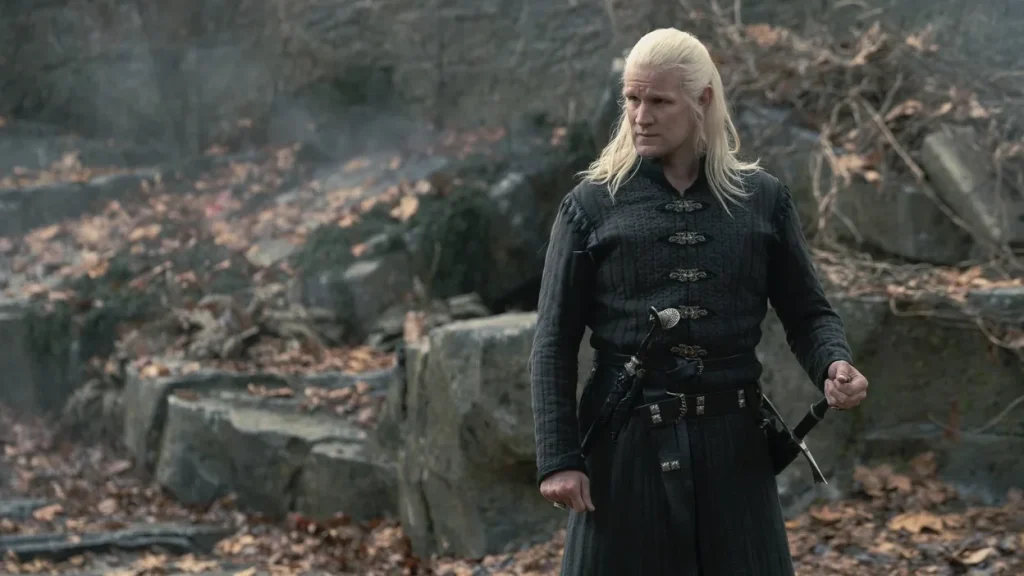
In the vision, Daemon saw his fate and understood his greater purpose: to get Rhaenyra on the Iron Throne and recognize the “darkness and doom” to come. Guided by the three-eyed raven, he saw the White Walkers, the end of dragons, and the rise of Daenerys Targaryen (Emilia Clarke).
The vision ended with Rhaenyra on the Iron Throne, and Daemon knew what he had to do. Helaena told him, “It’s all a story, and you are just one part of it. You know your role. You know what you must do.”
Alicent’s Offer and Aegon’s Escape
Alicent came to Rhaenyra at Dragonstone, offering her a way to win the war by leaving the doors to the Red Keep unlocked. Through tears, she agreed to Rhaenyra’s condition: Aegon’s head.
However, Aegon heeded Larys’ warning and left the Red Keep for Braavos, making the agreement doubtful.
A Season Defined by What Doesn’t Happen
“The Queen Who Ever Was” is defined by what doesn’t happen. There are no major battles or deaths.
Unlike “Game of Thrones,” “House of the Dragon” uses “Fire & Blood,” a complete yet ambiguous history, allowing showrunner Ryan Condal to pick and choose the narrative.
Interpersonal Crescendos and Daemon’s Acceptance
The episode’s crescendos were interpersonal. Daemon accepted Rhaenyra as his superior, Alyn confronted his father, Corlys, and Alicent admitted she was wrong to help start the war.
Regardless of potential disappointment for fans, the finale emphasizes relationships over battles.
The Future of House of the Dragon
Despite mismanaging the pace of internal journeys, the season ends with armies on the march. When action arrives, “House of the Dragon” cuts around it or makes it unpleasant to watch, focusing on human thoughts and feelings over spectacle.
The season illustrates the slippery slope of armed conflict, with war crimes, child murder, and the demise of dragons—the certainty of more deaths colors every interaction and scene.
The finale sets the stage for a grim and intense Season 3, focusing on the human cost of the Targaryen conflict.

